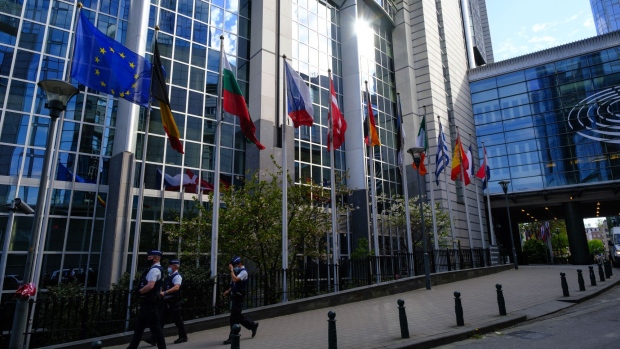May 20, 2021
EU Carbon Rally Triggers Greens’ Call for Curbs on Speculation
, Bloomberg News

(Bloomberg) -- The Greens in the European Union want to bolster the region’s carbon market so that the price on pollution triples by the end of the decade while limiting the role of financial investors in the cap-and-trade program.
The permits to discharge carbon dioxide in the EU Emissions Trading System soared 140% over the past year to more than 50 euros per metric ton as the bloc moved ahead with its bold climate strategy. Investment funds, flocking into the world’s biggest greenhouse-gas market on the Green Deal, have helped accelerate the rally and some of them expect prices to rise to around 100 euros, possibly as soon as the end of this year.
The Greens, the most climate-ambitious political group in the EU Parliament, are in favor of high carbon prices, targeting 150 euros per ton by 2030 to ensure that that utilities and manufacturers shift away from fossil fuels. Yet they want the increase in cost of pollution to be gradual and based on fundamentals, an issue the European Commission should take into account in a planned reform of the market, lawmakers Bas Eickhout and Michael Bloss said on Thursday.
“What is important, and what we expect the commission will also be looking at, is how we can limit the effect of the speculation on the price,” Eickhout, vice-president of the Greens group in the EU Parliament, told reporters. “There is always a role for speculation, it’s a carbon market, but it needs to be limited. We want that the price be driven by supply and demand and now it’s too much driven by speculation.”
The Commission, the EU regulatory arm, will put forward on July 14 a package of measures to align the economy with a new 2030 emissions-reduction target of at least 55% from 1990 levels. Once the details of the carbon market reform have been unveiled, Eickhout expects prices to stabilize around 50 to 60 euros. Still, the commission’s proposals will need approval by national governments and the EU Parliament in a process that may take as long as two years.
The EU ETS is the bloc’s flagship climate policy tool, imposing gradually shrinking pollution caps on about 12,000 installations owned by manufacturers and utilities as well as airlines. Participants are required to hold permits to match their CO2 output.
The Greens want the EU ETS reform, the biggest to date, to include a price floor of 50 euros in order to ensure that companies in the region shift away from fossil fuels. It should gradually increase every year, to reach 150 euros by the end of the decade.
“Additional rules should be introduced to avoid speculation on ETS allowances, e.g. by limiting the amount of ETS allowances to be held by financial market participants,” the Greens said in their position paper. The Greens stopped short of providing any further details on their demand.
The issue of speculation has also triggered complaint from Poland, with the government asking the commission to investigate the role of financial players in recent price spikes.
Poland Asked EU in March to Clarify Carbon Rally on Speculation Concerns
The Greens also support the so-called rebasing, or a one-off reduction of the emissions cap to remove surplus allowances. In addition, the rate at which the cap shrinks each year, known as the Linear Reduction Factor, should be raised from the current 2.2% to as much as 5.8% in 2023, depending on the size of the rebasing.
Here are some other elements of the Greens’ position on the overhaul of the market:
- EU emissions trading should include aviation and shipping but mustn’t be applied to road transport and heating
- Excess allowances held in the Market Stability Reserve should be canceled after a maximum of 5 years and no allowance should be released from the reserve if the previous year’s emissions exceeded the cap
- Free carbon permits for companies should be phased out
- A carbon border adjustment mechanism should start as of 2023 and include cement, steel, aluminum, chemicals, fertilizers and the power sector
- CBAM should by 2026 replace current carbon leakage provisions
- EU should not allow any international carbon offsets because its targets need to be achieved domestically
- Revenues from ETS should be used to enhance climate action
©2021 Bloomberg L.P.


